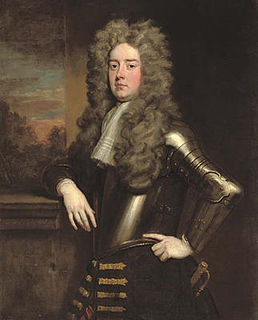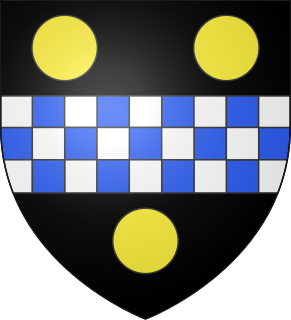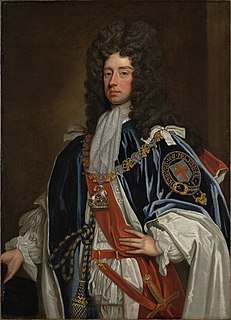 W
WArchibald Campbell, 1st Duke of Argyll, 10th Earl of Argyll was a Scottish peer.
 W
WJohn Sheffield, 1st Duke of Buckingham and Normanby, was an English poet and Tory politician of the late Stuart period who served as Lord Privy Seal and Lord President of the Council. He was also known by his original title, Lord Mulgrave.
 W
WPhilip Stanhope, 2nd Earl of Chesterfield PC FRS was a peer in the peerage of England.
 W
WEdward Hyde, 3rd Earl of Clarendon, styled Viscount Cornbury between 1674 and 1709, was an English aristocrat and politician. Better known by his noble title Lord Cornbury, he was propelled into the forefront of English politics when he and part of his army defected from the Catholic King James II to support the newly arrived Protestant contender, William III of Orange. These actions were part of the beginning of the Glorious Revolution of 1688. Cornbury's choice to support his cousin Anne instead of William after the rebellion cost him his military commission. However, Cornbury's support of King William's reign eventually earned him the governorship of the provinces of New York and New Jersey; he served between 1701 and 1708.
 W
WAlgernon Capell, 2nd Earl of Essex PC of Cassiobury House, Watford, Hertfordshire, was an English nobleman, a soldier and courtier.
 W
WEdward Henry Lee, 1st Earl of Lichfield was an English peer, the son of a baronet, who at 14 years of age married one of the illegitimate daughters of King Charles II, Charlotte Lee, prior to which he was made Earl of Lichfield. They had a large family; Lady Lichfield bore him 18 children. He was a staunch Tory and followed James II to Rochester, Kent after the king's escape from Whitehall in December 1688. His subsidiary titles were Viscount Quarendon and Baron Spelsbury.
 W
WThomas Innes Pitt, 1st Earl of Londonderry was a British Army officer, speculator and Whig politician who sat in the House of Commons from 1713 to 1728. He served as Governor of the Leeward Islands from 1728 to his death in 1729.
 W
WJohn Middleton, 1st Earl of Middleton was a Scottish army officer, who belonged to a Kincardineshire family which had held lands at Middleton in Aberdeenshire since the 12th century.
 W
WHenry Howard, 7th Duke of Norfolk, KG PC Earl Marshal was an English nobleman, politician, and soldier. He was the son of Henry Howard, 6th Duke of Norfolk and Lady Anne Somerset, daughter of Edward Somerset, 2nd Marquess of Worcester and Elizabeth Dormer. He was summoned to the House of Lords in his own right as Baron Mowbray in 1678. His unhappy marriage was a subject of much gossip, and ended in divorce.
 W
WHenry Mordaunt, 2nd Earl of Peterborough was an English soldier, peer and courtier.
 W
WJames Douglas, 2nd Duke of Queensberry and 1st Duke of Dover was a Scottish nobleman.
 W
WColonel Francis William Rhodes is perhaps the best known member of the Rhodes family after his brother Cecil. Trained as a soldier from his youth, he participated in a considerable amount of conflict in different parts of the world. After graduating from the Royal Military College, Sandhurst, he joined the 1st Royal Dragoons in 1873 and served the British Army for 23 years. He participated in the Sudan Campaign, accompanied the Nile Expedition to Khartoum in the abortive effort to relieve General Charles George Gordon, and was present at the battles of El Teb and Tamai. At the Battle of Abu Klea, he distinguished himself when he had several horses shot from under him in the course of the engagement. He was awarded several medals and clasps, including the Distinguished Service Order.